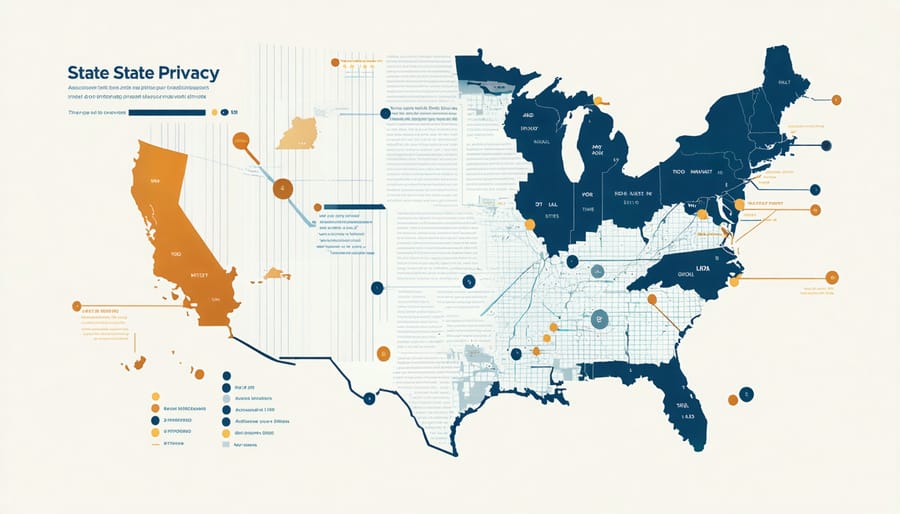Data privacy regulations demand immediate attention from construction firms handling sensitive project information, client data, and employee records. The California Consumer Privacy Act (CCPA) and emerging state-level regulations now mandate strict controls over personal data collection, storage, and sharing – with penalties reaching up to $7,500 per intentional violation.
For construction companies operating across multiple states, compliance requires implementing robust data protection frameworks that address both current and upcoming requirements. Project management platforms, BIM collaboration tools, and digital documentation systems must incorporate privacy-by-design principles to safeguard sensitive information throughout the project lifecycle.
Key concerns include securing bid documents containing proprietary pricing data, protecting subcontractor information, managing employee personal data, and ensuring compliant data handling practices across job sites and office locations. With 75% of states expected to enact comprehensive privacy legislation by 2025, construction firms must establish scalable privacy programs that can adapt to evolving requirements while maintaining operational efficiency.
This article examines essential compliance strategies, practical implementation steps, and industry-specific considerations to help construction professionals navigate the complex landscape of U.S. data privacy regulations while maintaining focus on core business objectives.
Key Federal Data Privacy Regulations Affecting Construction
CCPA and CPRA Impact on Project Data
California’s privacy laws, particularly the California Consumer Privacy Act (CCPA) and the California Privacy Rights Act (CPRA), significantly impact how construction firms handle project data and personal information. These regulations affect companies managing California residents’ data, regardless of where the business is located.
For construction firms, these laws apply to various data types commonly collected during projects, including client information, employee records, subcontractor details, and digital documentation from smart building systems. Companies must maintain detailed records of collected personal information and provide clear notices about data collection practices.
Key compliance requirements include:
– Implementing systems to respond to data access and deletion requests
– Maintaining data inventories of collected personal information
– Establishing data protection measures for sensitive information
– Updating vendor contracts to include specific privacy provisions
– Training employees on proper data handling procedures
Construction firms must pay particular attention to project management platforms and building information modeling (BIM) systems, as these often contain personal information subject to CCPA and CPRA regulations. This includes ensuring proper data handling when sharing project information with subcontractors and other stakeholders.
To maintain compliance, construction companies should conduct regular privacy impact assessments, update privacy policies, and implement robust data security measures. This is especially crucial when dealing with smart building technologies and IoT devices that collect occupant data.

State-Level Privacy Laws for Construction Companies
Construction companies operating across multiple states face an increasingly complex landscape of state privacy regulations. California leads with the CCPA and CPRA, requiring construction firms to implement robust data protection measures for employee information, client records, and project documentation. Virginia’s CDPA and Colorado’s CPA have introduced additional compliance requirements, particularly affecting how construction companies handle subcontractor data and digital building information modeling (BIM) files.
Notable requirements include mandatory privacy notices, data inventory maintenance, and specific protocols for handling sensitive information such as biometric data from jobsite security systems. Construction firms must also ensure proper data handling practices when sharing project information with architects, engineers, and other stakeholders across state lines.
Companies operating in states with comprehensive privacy laws must:
– Maintain detailed records of data collection and processing activities
– Implement appropriate security measures for digital project files
– Establish clear procedures for responding to data subject access requests
– Ensure vendor contracts include required privacy provisions
– Train employees on proper data handling procedures
As more states develop privacy legislation, construction companies should adopt a proactive approach to compliance, implementing scalable privacy programs that can adapt to evolving requirements while maintaining operational efficiency.
Critical Data Types Requiring Protection
Project Documentation and Client Information
Project documentation and client information require stringent protection measures in the construction industry. All contracts, specifications, and client data must be stored securely with controlled access and proper encryption protocols. Implement a tiered access system where team members can only view information relevant to their roles and responsibilities.
Maintain detailed records of who accesses sensitive documents and when, using secure document management systems with audit trails. Store physical documents in locked cabinets with monitored access, and ensure digital files are protected through enterprise-grade encryption and secure cloud storage solutions.
For client communications and project specifications, use secure file-sharing platforms that comply with industry standards. Implement strict protocols for handling personally identifiable information (PII) and sensitive business data. This includes proper disposal methods for both physical and digital documents when they’re no longer needed.
Establish clear data retention policies that comply with state and federal regulations. Document all privacy measures in your company’s data protection policy, and regularly train staff on proper handling procedures. Include specific provisions in subcontractor agreements regarding data protection responsibilities and confidentiality requirements.
Create incident response plans for potential data breaches, including notification procedures for affected clients and regulatory authorities. Regular audits of documentation handling practices help ensure ongoing compliance and identify areas for improvement in your data protection strategy.

Employee and Contractor Data Management
Construction companies must implement robust protocols for managing employee and contractor personal data to comply with federal and state privacy regulations. This includes protecting sensitive information such as Social Security numbers, medical records, financial details, and employment history.
Under the Fair Labor Standards Act (FLSA) and various state laws, employers must maintain secure personnel records while ensuring authorized access for payroll, benefits administration, and compliance reporting. Construction firms should establish clear data retention policies that specify how long different types of records must be kept and proper disposal methods when no longer needed.
For contractors and subcontractors, companies must carefully manage confidential business information, tax documentation, and insurance certificates. Written agreements should clearly outline data handling expectations, including provisions for protecting proprietary information and personal data of contractor employees working on construction sites.
Best practices include:
– Implementing role-based access controls for personnel files
– Encrypting sensitive data during storage and transmission
– Maintaining separate secure storage for medical information
– Conducting regular audits of data access and security measures
– Training staff on proper data handling procedures
– Developing incident response plans for potential data breaches
Companies operating across multiple states must ensure compliance with varying state-level privacy requirements while maintaining consistent internal policies. Regular review and updates of data management procedures help maintain compliance as regulations evolve and new privacy laws emerge.
Compliance Implementation Strategies

Digital Security Measures
To effectively protect sensitive data in the construction industry, organizations must implement robust digital security measures that align with U.S. data privacy regulations. Encryption remains a fundamental requirement, particularly for protecting personally identifiable information (PII) and project-specific data during storage and transmission.
Access control systems should employ multi-factor authentication (MFA) for all users accessing sensitive information, especially when connecting to project management platforms and document sharing systems. Role-based access control (RBAC) ensures that employees only have access to data necessary for their specific job functions.
Regular security audits and vulnerability assessments are essential to identify potential weaknesses in data protection systems. Construction firms should maintain detailed logs of all data access and modifications, enabling both compliance verification and incident investigation when necessary.
Secure data backup solutions must be implemented with encryption at rest and in transit. Cloud storage services used for project documentation should meet SOC 2 Type II compliance standards and include features for data loss prevention (DLP).
Mobile device management (MDM) solutions are crucial for securing data on tablets and smartphones used on construction sites. These systems should enable remote wiping capabilities and enforce device-level encryption.
Organizations must also establish incident response plans that outline procedures for detecting, reporting, and addressing data breaches. This includes maintaining communication protocols with relevant authorities and affected parties in accordance with state-specific breach notification requirements.
Staff Training Requirements
Regular staff training is fundamental to maintaining data privacy compliance in construction operations. Organizations must implement comprehensive training programs that cover both general data protection principles and industry-specific protocols. Key personnel should receive initial training upon hiring and participate in periodic refresher courses at least annually.
Training programs must address essential topics including proper handling of sensitive project data, client information security, secure communication protocols, and incident response procedures. Construction firms should ensure their staff understands the specific requirements of relevant regulations such as CCPA, GDPR (if working with international clients), and state-specific privacy laws.
Project managers and site supervisors require additional specialized training focusing on protecting digital blueprints, bid documents, and contractor information. IT staff need advanced training in cybersecurity measures, data encryption, and security system maintenance.
Documentation of all training activities is crucial for compliance verification. Organizations should maintain detailed records of training sessions, attendance, and assessment results. Interactive training methods, including practical scenarios and real-world case studies from the construction industry, prove most effective for knowledge retention.
Consider implementing role-based training modules that address specific privacy concerns for different departments, such as HR, procurement, and field operations. Regular assessments help identify knowledge gaps and areas requiring additional focus, ensuring continuous improvement in data protection practices.
Documentation and Reporting Procedures
Construction firms must maintain comprehensive records of their data privacy compliance efforts, following established documentation and reporting standards to demonstrate due diligence. Essential documentation includes detailed records of data collection processes, consent forms, privacy impact assessments, and data breach incident reports.
Key documentation requirements include maintaining an up-to-date inventory of all personal data collected, processed, or stored, including client information, employee records, and subcontractor data. Organizations must document the purpose of data collection, retention periods, and security measures implemented to protect sensitive information.
Regular privacy audit reports are mandatory, typically conducted annually or when significant changes occur in data handling processes. These reports should detail compliance measures, identify potential risks, and outline remediation strategies. Construction companies must also maintain records of employee training programs related to data privacy and security protocols.
In the event of a data breach, organizations must document the incident timeline, affected data types, response measures taken, and notifications made to affected parties and relevant authorities. This documentation serves as crucial evidence of compliance and helps demonstrate the organization’s commitment to protecting sensitive information.
All documentation should be retained for a minimum period as specified by applicable regulations, typically ranging from three to seven years, depending on the jurisdiction and type of data involved.
Future Privacy Regulations on the Horizon
Several significant privacy regulations are expected to emerge in the coming years, requiring construction firms to adapt their data handling practices. The American Data Privacy Protection Act (ADPPA), currently under consideration, would establish comprehensive federal standards for data protection and consent requirements. This legislation could streamline compliance efforts by creating uniform national standards, replacing the current patchwork of state regulations.
Construction companies should prepare by implementing robust risk management strategies that anticipate these changes. Key focus areas include strengthening data encryption protocols, establishing clear data retention policies, and developing comprehensive incident response plans.
Industry experts predict increased scrutiny of biometric data collection, particularly relevant for construction sites using facial recognition for access control and time tracking. Companies should review their current biometric data practices and prepare for stricter consent requirements and storage regulations.
The Internet of Things (IoT) devices and smart building technologies will likely face enhanced privacy requirements. Construction firms utilizing connected devices for project monitoring and building management systems should implement privacy-by-design principles in their technology deployments.
To stay ahead of these changes, organizations should conduct regular privacy impact assessments, maintain detailed data inventories, and establish clear protocols for data handling across project teams and subcontractors. Early preparation will ensure smoother compliance transitions when new regulations take effect.
As the regulatory landscape continues to evolve, construction firms must take decisive action to protect sensitive data and maintain compliance. Begin by conducting a comprehensive data audit to identify all personal information collected, stored, and processed across your organization. This includes employee records, client data, and subcontractor information.
Establish a dedicated privacy compliance team responsible for implementing and maintaining data protection measures. This team should develop clear policies and procedures for data handling, including protocols for data collection, storage, access controls, and disposal.
Invest in robust cybersecurity infrastructure and regularly update security measures to protect against emerging threats. Implement employee training programs to ensure all staff members understand their role in maintaining data privacy and security.
Review and update vendor contracts to include specific data protection requirements and establish clear accountability for data handling practices. Develop incident response plans that outline steps to take in case of a data breach, including notification procedures for affected parties and regulatory authorities.
Document all privacy-related processes and maintain detailed records of compliance efforts. Regular audits and assessments will help identify gaps and areas for improvement in your data protection strategy.
Remember that compliance is an ongoing process, not a one-time effort. Stay informed about regulatory changes and industry best practices to ensure your organization remains ahead of evolving privacy requirements while maintaining efficient operations and protecting stakeholder interests.

